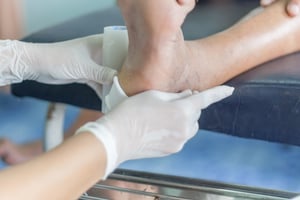 Diabetic patients are likely familiar with the risks that come with their condition for slow and non-healing wounds, particularly in the feet and lower legs. Over 30 million Americans suffer from diabetes, and of these, as many as 15 percent have foot ulcers. Skin lesions and ulcers require careful treatment in any patient, but this is particularly true for those with diabetes, as they tend to heal more slowly and are more likely to become infected. If you have diabetes and have developed a wound in a lower extremity, it is imperative to seek medical care. Additionally, there are steps you can take on your own to help the wound heal and to protect it from infection.
Diabetic patients are likely familiar with the risks that come with their condition for slow and non-healing wounds, particularly in the feet and lower legs. Over 30 million Americans suffer from diabetes, and of these, as many as 15 percent have foot ulcers. Skin lesions and ulcers require careful treatment in any patient, but this is particularly true for those with diabetes, as they tend to heal more slowly and are more likely to become infected. If you have diabetes and have developed a wound in a lower extremity, it is imperative to seek medical care. Additionally, there are steps you can take on your own to help the wound heal and to protect it from infection.
Keep the Wound Covered
While your initial inclination may be to allow your wound exposure to air, this is not advisable. In the past, many believed airing out a wound, cut, or ulcer would speed healing. However, we now know that wounds heal best when covered and kept moist. When they aren't covered, surface cells of the wound tend to dry out, slowing the healing process.
Minimize Pressure on Diabetic Foot Ulcers
Too much pressure on a wound is another factor that can inhibit the healing process. This is especially true for those that affect the feet. When a diabetic patient is suffering from a foot ulcer, it is important to limit pressure and avoid weight bearing whenever possible. This means limiting any unnecessary activities and using aids such as crutches when ambulating.
Monitor Blood Sugar Levels to Help Wounds Heal
As a diabetic patient, you already know you have to regularly monitor your blood sugar levels and maintain them in a healthy range. However, this becomes especially important when a wound is involved. Elevated blood sugar levels can result in stiffening of cell walls, hampering blood flow as well as the overall healing process.
Seeking Medical Treatment for Diabetic Foot Ulcers
Proper evaluation and care from a physician can make a significant difference in wound healing for diabetic patients. Not only can they provide proper dressing, medication, or ointments to speed healing, they can also use tools to address wounds that are particularly slow to heal, including hyperbaric oxygen therapy (HBOT).
At Lane, our team of specialists offer advanced wound care, as well as HBOT to patients in Zachary, Baton Rouge, and the surrounding areas. To learn more or to request an appointment, click the button below.



.png?width=110&height=110&name=lane%20badge%20(1).png)
